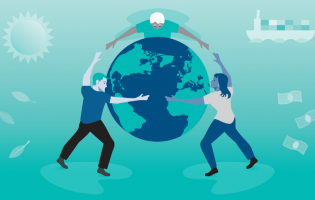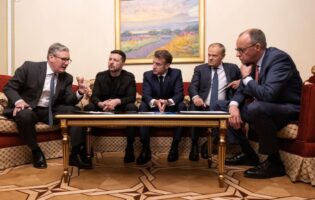Transatlantic Trade and Globalization
On October 21, 2011, the American-German Institute (AGI) and the Brandenburgisches Institut für Gesellschaft und Sicherheit (BIGS) co-organized a conference on “Transatlantic Trade and Globalization: Status Quo or Engine for Growth?” in Washington, DC. The conference was generously supported by the Transatlantik-Programm der Bundesregierung der Bundesrepublik Deutschland aus Mitteln des European Recovery Program (ERP) des Bundesministeriums für Wirtschaft und Technologie (BMWi) with additional support from the AGI Business & Economics Program.
The first panel focused on multilateral trade and globalization. The panelists Klaus Deutsch from Deutsche Bank, Gary Hufbauer from the Peterson Institute for International Economics, and Oliver Wieck from the Bundesverband der Deutschen Industrie e.V., addressed questions such as what is the future of the Doha Round and what happens if the round fails? What are the positions of Germany and the U.S. in the Doha Round? Do they have common interests regarding world trade? If so, how can they best achieve their interests? Are world trade rounds still a viable tool for agreeing on rules and regulations for world trade? Is the World Trade Organization (WTO) still the best tool to regulate trade?
The world’s economies are currently facing fiscal and structural adjustments and the outlook continues to be bleak, indicating that fixing the current economic crisis will take many years. The current economic turmoil is not a very good climate for trade policy, which needs a positive growth outlook. It also puts pressure on governments, which leads to nationalizing banks and can produce xenophobic trends. Once protection is established it is very hard to abolish it. Covert protection exists outside of WTO rules, which is unfortunate and not recognized by WTO presidents. For example, Brazil and the U.S., with its “buy American” slogan, promote local content in all their productions around the world.
However, there are also positive developments in trade policy this year: Free trade agreements between the EU and South Korea and the EU and Canada were finalized. The U.S. Congress also just approved three new free trade agreements.
The DOHA round started when China joined the WTO, with a three tier system that included powerful emerging markets and poor developing countries. One of the failures of the Doha round is that it is trying to replicate the Uruguay round, which operated under a consensus rule. This was feasible when there were few member states, but now with 153 member states it becomes impossible to agree on anything. Doha and the WTO as a negotiating forum have seen better days. To move forward, panelists suggested the following:
- A different formula for negotiations is needed: pluri-lateral agreements. Three-fourths of the negotiating countries would have to agree to a treaty and the benefits would only extend to signatory countries but agreements would be open to future signees.
- The WTO has a future as a dispute settlement body to fill in the huge gaps that exist in trade policy agreements.
The panelists argued that reviving Doha could also propel the transatlantic economic partnership further and could serve as a model for the world, which others would eventually join. However this development will take time and political will. The EU and the U.S. have been responsible for developing the trade agenda for Doha for too long and new trading partners such as the emerging markets require new models.
The second panel addressed the potential for the Transatlantic Economic Council (TEC), analyzing questions such as the TEC be improved? How can transatlantic trade be fostered and is the TEC the appropriate framework to do so? What topics will be priorities for Germany and the U.S. to address in the TEC in the future? Panelists were Stormy-Annika Mildner (Stiftung Wissenschaft und Politik), Peter Rashish (U.S. Chamber of Commerce), Hiddo Houben (Delegation of the European Union), and David Weiner (Office of the U.S. Trade Representative).
The goal of the TEC is to reduce costs, avoid trade diversion, prevent long and costly trade conflicts, streamline regulation, and avoid a “race to the bottom” among transatlantic partners—who comprise 40 percent of the world’s gross domestic product (GDP). High regulatory barriers are current obstacles to transatlantic trade, particularly in the fields of chemical, cosmetics, and aerospace. The TEC has seen achievements, particularly access to raw materials and secure trade, but stumbling blocks remain: hard to measure reciprocal market access; regulations impacted by consumers’ risk perceptions, culture, and preferences; mutual trust; and low political priority.
Speakers were optimistic about the TEC for this year, citing the upcoming meeting in November that will focus on new sectors and technologies, such as electric vehicles. As they try to identify new issues for TEC—including nanotechnology and cloud computing—experts must decide whether the TEC can add value to progress already underway in those industries. Leading up to the November 2011 meeting, there are strong indicators that there is more commitment to keeping the TEC framework moving forward: ongoing work between TEC meetings; senior officials acting as TEC facilitators; and permanent TEC coordinator positions in the U.S. State Department, U.S. Commerce Department, and EU Trade Directorate.
Following the recently ratified free trade agreements in the U.S., potential is great for transatlantic trade policy. High debt, high unemployment, and the need for deficit reduction on both sides of the Atlantic demonstrates a need for economic growth as the United States and European Union compete with growing powers in Asia. Strong existing trade and economic cooperation between the U.S. and EU suggests that a free trade area—as Merkel originally wanted—may not be necessary, but trade across the Atlantic would benefit from legally binding agreements. Although it currently is a stand-alone organization, the TEC can be integrated into a broader set of tools to enhance transatlantic trade and, consequently, benefit the American and European economies.






